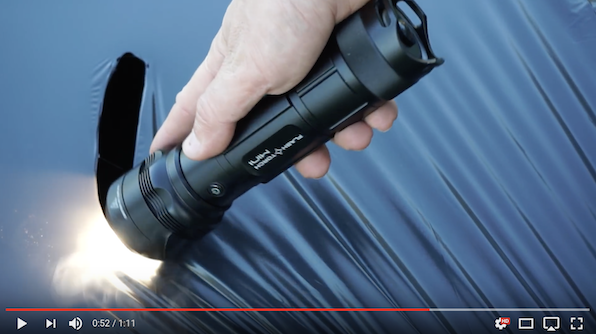Home
A comprehensive resource for safe and responsible laser use
US: 2 Watt "laser bongs" for sale
The laser beam is so intense it is a diffuse reflection hazard. The bong comes with 2 pairs of protective eyewear.
![]()
The founder of the company said in a November 2018 email to Mashable that the laser is not dangerous but can sting if you get your hand in it "kind of like a magnifying glass."
In addition to the 445 nm blue laser and protective glasses, the app-controlled bong also has a rotating bowl and color-changing LEDs.
The product has been in the works for some time. According to Gizmodo, a January 11 2018 Instagram video from Silicon Cali's founder demonstrated a prototype laser bong available for pre-order. On January 23 2018, he wrote on Instagram about shipping time: "It’s just dealing with the FDA regulation and all the other requirements for manufacturing and selling a high powered class4 laser product in the USA that take the time."
It is not known when the late fall 2018 version officially went on sale.
At the company's website, as of November 5 2018 there is no mention of FDA certification nor any picture of FDA-required warning labels, though there is a description of "turn key ignition." In the photo above, a small key can be seen inserted into the bottom of the bong. Federal law requires a key or similar lock-out device to prevent laser devices from being turned on by unauthorized users.
Laser bongs are a relatively old idea among persons interested in high tech and recreational drugs. A web search turns up a July 30 2009 post to Grasscity Forums, linking to a YouTube video of a prototype LaserBong (different product) made by the chief engineer of Wicked Lasers. The video is now unavailable at YouTube. Other YouTube videos still online show, for example, a June 4 2013 video of a person using a handheld blue laser to ignite bong material.
From Silicon Cali with additional reporting by Mashable and Gizmodo.
World: Wicked Lasers sells white-light flashlights (non-laser) capable of burning objects
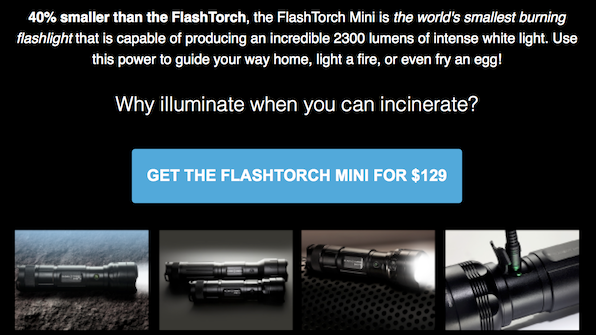
A YouTube video demo shows the flashlight burning a swath of black plastic:
Both the original FlashTorch and the Mini version have a regular price of USD $199.
Wicked Lasers is known for being the first widespread supplier of Class 4 handheld lasers, with a nominal 1 watt blue laser introduced in mid-2010. Since that time, Wicked has taken laser safety actions such as requiring a buyer to take a short safety test before allowing an order, voluntarily putting a label on the laser warning not to aim at aircraft, supplying safety information with the laser, and supporting laser safety efforts.
From a email sent June 7 2018. The FlashTorch webpage is here. Previous LaserPointerSafety.com stories about Wicked Lasers are here.
Worldwide: Wicked Lasers to stop shipping high-powered lasers to U.S. on Jan. 1 2015
The sales restriction does not seem to be the result of any particular regulatory actions or other outside forces; instead it appears to be a decision by the “new ownership and management” that was also announced at the same time.
Wicked currently sells handheld lasers up to 2000 milliwatts (2 watts). In the U.S., lasers sold as “pointers” or for pointing purposes must be below 5 milliwatts output power; handheld battery-powered lasers over that power may still be sold legally if they are not “pointers” and if they meet FDA safety requirements for their laser class. All Wicked Lasers sold in 2015 will thus be within the U.S. “pointer” range of power.
The announcement came with a 40% off sale, so the company will still be shipping high-powered lasers through December 31 2014.
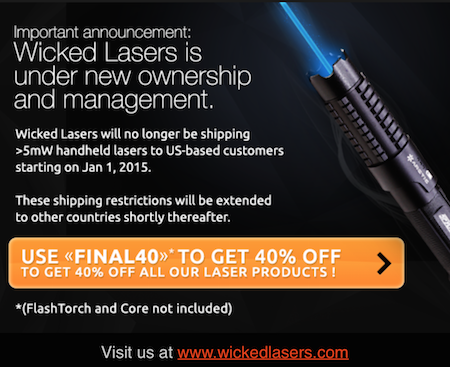
From the email announcement Wicked Lasers sent to customers on Nov. 19 2014 (shown above).
Worldwide: Google AdWords ads to include warning not to aim at planes
Wicked is a major internet advertiser and a heavy user of AdWords. By doing this, the company puts the information in front of a large audience of persons whose browsing history indicates they are interested in lasers.

The Wicked Lasers AdWords ad, with the safety phrase highlighted to show its location. (The highlighting does not appear in the actual ad.)
The company’s intent is to help reduce the number of incidents of persons aiming lasers at aircraft. They are also one of the few companies to include a “don’t aim at aircraft” warning on their lasers’ labels, and in the user manual.
Brought to our attention by Steve Liu, CEO of Wicked Lasers
Worldwide: Wicked Lasers begins using independent Laser Safety Facts website
This is the first time that Wicked, or any consumer laser manufacturer, has used the proposed “Laser Safety Facts” labeling system which aims to give the general public detailed and easily accessible safety data. A key part of this proposal is that the information is not controlled by Wicked or any laser manufacturer; instead it comes from an independent source.
Click to read more...
World: Smartphone app can remotely control handheld laser
The company’s free “Evo” app is available on Apple iOS and Android app stores. A smartphone connects to the Evo laser either using a cable from the audio output jack, or wirelessly using an optional $40 Bluetooth module that attaches to the laser. Once connected, the app allows remote control of the laser’s output power, and of its flashing frequency. (Although anyone can download the app, the software does not appear to run unless connected to a Wicked E4 series laser such as the Evo.)
The software code is available as open source, so that hobbyists can create their own software to custom-control the Evo.
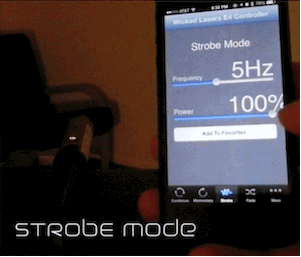
Operating modes include Continuous, Momentary, Strobe, Fade, Morse Code and Ambient (microphone audio level). Click for a YouTube video showing these modes in action.
Germany: Hobbyist creates laser "Gatling gun" with six rotating 1.4 W blue beams
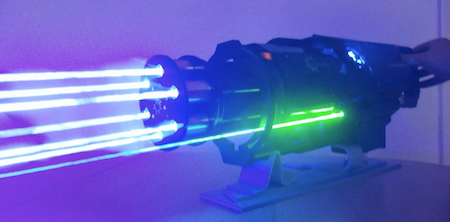
US: FDA updates "Red List" of banned laser importers and products
- The laser product does not have a permanently attached warning logotype label;
- The laser product output exceeds 5 milliwatts;
- The laser product fails to contain certification or identification information either on the product or in the instructions for use;
- The laser product fails to contain instructions for safe use;
- The product class or output information on the laser product's warning logotype label is different from that in the instructions for use; and/or
- A product report for the laser product has not been submitted.
Products which can be Detained Without Physical Examination (DWPE) include laser pointers, laser gunsights, laser pens, laser light show projectors, laser special effects, laser levels, toy guns with lasers, laser pointer key chains, and similar products.
It is unclear what effect the FDA’s import restrictions have on supplies. For example, the well-known company Wicked Lasers is listed multiple times as being banned from importing “All laser products and all products containing lasers.” However, a company representative on December 22 said that Wicked does ship to the U.S. and there should be “no issues getting a laser into the U.S.”
Violating companies are listed as follows.
- Canada: 2 companies shipping from a total of 3 addresses
- China: 51 companies shipping from a total of 57 addresses
- Hong Kong: 9 companies shipping from a total of 9 addresses
- Japan: 1 company shipping from a total of 2 addresses
- Taiwan: 25 companies shipping from a total of 28 addresses
- United Kingdom: 1 company shipping from 1 address
From the December 20 2011 update to the FDA Red List
Worldwide: New 1 watt green handheld laser can distract pilots 20 miles away
LaserPointerSafety.com’s analysis shows it is a distraction hazard to pilots up to 20 miles from the laser source.Click to read more...
US: NY Times says injury increase feared from higher powered lasers
The article listed four injuries to youths. In three of the incidents, a young person deliberately stared into a laser beam, while the fourth was caused by a high-schooler whose friend waved a 50 mW laser in his face. (Besides these anecdotal accounts, the article gave no overall statistics on injuries except to say that an ophthalmologist association is “unaware of any increase in eye injuries caused by lasers.”)
Author Christine Negroni covered a number of topics, including:
- There has been “ninefold increase over five years” in laser illuminations of aircraft
- Eye doctors are “shocked” that high-powered lasers are available on the Internet with no purchase restrictions.
- A U.K. physician says the U.S. limit should be 1 mW, that even at 5 mW laser pointers have “acute” dangers.
- FDA says that noncompliant (“illegal”) lasers are available despite agency seizures.
- Wicked Lasers says that its products are compliant, that they are “extremely clear” about eye and fire hazards on their webpages, and that they will be offering online safety lessons “before checkout”.
- A “large community” of laser enthusiasts wants to keep lasers available.
- An 18-year-old laser hobbyist, who wears goggles and is supervised by his parents, said he was learning about electronics, soldering, physics, light, optics and mechanics.
From the New York Times, online on Feb. 28 2011, in print on March 1 2011 on page D5 of the National edition.
US: FDA "disapproves" of Wicked Lasers; stops imports
FDA cites eight items of noncompliance:
- Three of these items relate to a January 2006 letter which FDA says Wicked did not respond to.
- Four items relate to Wicked claiming in 2006 and 2008 that its lasers were sold for surveying, leveling and alignment (SLA) purposes; FDA says Wicked is not complying with restrictions on SLA lasers. (FDA has greater authority to regulate SLA lasers than it does to regulate general-purpose lasers).
- The final item objects to Wicked stating on its website that its products are “FDA Certified” when in fact the manufacturer certifies compliance to FDA, who reviews and files the certification documents.
The restrictions will be lifted, FDA told Wicked, once “CDRH determines that you have established an adequate quality testing program, and you have submitted the required reports and report supplements.”
From Gizmodo. The full text of FDA’s warning letter to Wicked is after the link (click “Read more...”)Click to read more...
Worldwide: Warning from Casio about misuse of its laser diodes
WARNING!
Casio America, Inc. (“Casio”) has recently learned that potentially dangerous handheld laser pointer devices are being marketed and sold by Wicked Lasers, Ltd. (and possibly others) that are believed to incorporate laser diodes improperly removed from Casio XJ-A series projectors. Casio has never authorized this unintended and potentially dangerous misuse of the light source component of its XJ-A series Projectors.
Casio specifically instructs and warns purchasers of its XJ-A series projectors that disassembly or modification of the built-in laser module is “very dangerous and should never be attempted,” and would like to take this opportunity to remind the laser enthusiast community of that fact. The unauthorized, unintended and potentially dangerous misuse of the laser diodes improperly removed from Casio XJ-A series projectors for use in these handheld lasers, such as Wicked Lasers’ SPYDER III, may create a substantial risk of fire and injury to users and others. Casio intends to pursue Wicked Lasers and any other companies that violate Casio’s rights by misusing components of its XJ-A projectors or other products to the fullest extent of the law.
At the same time, Casio strongly urges consumers to avoid these unauthorized and potentially dangerous “laser pointers” such as the SPYDER III.
Worldwide: Dangerous 1 watt laser on sale for only $200 (+ updates)
Wicked Lasers advertises the 1 watt Spyder III Pro Arctic as “the most dangerous laser ever created”. This is not far from the truth; it is by far the most dangerous laser affordable by the general public. Previously, such a laser would have cost many thousands of dollars.Click to read more...
Worldwide: Major laser seller adds aircraft warning
WARNING: DO NOT SHINE YOUR LASER AT AN AIRCRAFT
Shooting a laser at an aircraft is considered a felony in the U.S.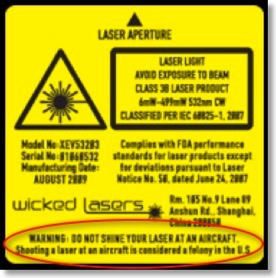
The new label is being introduced in September 2009 by Wicked Lasers. They have a significant presence on the Internet, marketing a wide range of lasers for pointing, burning/cutting, and general purpose uses.
